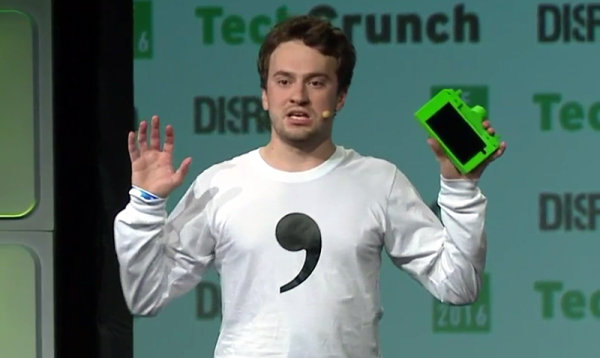This week [Geohot] announced the launch of his self-driving car hardware. This is the natural extension of his proof-of-concept shown off in December which he parlayed into a Silicon Valley startup called comma.ai. [Geohot], whose real name is [George Hotz], is well known for jailbreaking the iPhone and making Sony look like idiots when they retroactively crippled Linux support on PS3. He has hardware chops.
Initial self-driving add-on hardware only works with Honda and Acura models that already have lane-keeping assist features because those vehicles already have built-in front radar. The package, which replaces the rear view mirror, adds a front facing camera. Those lucky (or brave, foolish, daring?) beta users can trade $999 and $24/month for what is currently a green 3D printed enclosure with some smartphone-like hardware inserted.
The company has taken an interesting approach to acquiring data needed for this particular flavor of self-driving. [Hotz] is teasing a chance at beta test invites to those who contribute driving data to the company. This is as simple as downloading an app to your phone and letting it roll from your windshield as you go bumper to bumper from Mountain View to San Francisco. That’s right, the plan is to support just that stretch of the nation’s highway system — although [Hotz] did make a brazen estimate of 90% of commutes for 90% of users within a year. Hey, it’s a startup so it’s either that, selling to a bigger fish, or closing their doors.
That narrow route support is actually an interesting constraint. In fact, the company is most interesting because of its chosen constraints: a small subset of cars, a chosen stretch of highway, and dare we say sanity when it comes to self-driving expectations. Grandiose claims have the general public thinking a vehicle with no human driver will slide up to your stoop and take you anywhere you want to go. That is a dauntingly difficult engineering challenge (dare we say impossible). What [Hotz] is selling is a more stress-free commute, not a nap in the back seat. You still need to be paying attention at all times.
Will this system work? Undoubtedly the engineering is possible (Tesla is already doing it). The biggest question mark that remains is human nature. This system demands your attention even though you’re doing nothing. That seems unrealistic — users are bound to lapse in attention much more frequently than if they were the primary driver. The question then becomes, will people pay attention at the very rare yet very crucial moments, and can a system like this prevent more fatal accidents than it causes?
[via Engadget]












